
ABOUT THE AUTHOR
Boze Hadleigh is a Hollywood historian and author of 26 books, including Marilyn Forever, Elizabeth Taylor: Tribute to a Legend, and Marilyn: Lost Images from the Hollywood Photo Archive. Hadleigh speaks five languages, has visited 64 countries, holds a masters degree in journalism, and has won on Jeopardy!. He lives in Beverly Hills, California, and Sydney, Australia.
ELIVS
THROUGH THE AGES

An imprint of The Rowman & Littlefield Publishing Group, Inc.
4501 Forbes Blvd., Ste. 200
Lanham, MD 20706
www.rowman.com
Distributed by NATIONAL BOOK NETWORK
Copyright 2019 The Hollywood Photo Archive
Photos from The Hollywood Photo Archive
All rights reserved. No part of this book may be reproduced in any form or by any electronic or mechanical means, including information storage and retrieval systems, without written permission from the publisher, except by a reviewer who may quote passages in a review.
British Library Cataloguing in Publication Information available
Library of Congress Cataloging-in-Publication Data available
ISBN 978-1-4930-3349-2 (hardcover)
ISBN 978-1-4930-4097-1 (e-book)
 The paper used in this publication meets the minimum requirements of American National Standard for Information SciencesPermanence of Paper for Printed Library Materials, ANSI/NISO Z39.48-1992.
The paper used in this publication meets the minimum requirements of American National Standard for Information SciencesPermanence of Paper for Printed Library Materials, ANSI/NISO Z39.48-1992.
This is dedicated to Ronald Boze Stockwell and to the memory of Flora and Walter.
B.H.
BY THE SAME AUTHOR:
Marilyn: Lost Images from the Hollywood Photo Archive
Marilyn Forever
Elizabeth Taylor: Tribute to a Legend
Hollywood Gays
Hollywood Lesbians: From Garbo to Foster
Celebrity Feuds!
ABOUT THE HOLLYWOOD PHOTO ARCHIVE
The Hollywood Photo Archive is not only a wonderful collection of cinematic history, it captures the collective memories of Hollywood. The gunmen, the gallants, the ghosts and the stars of the big screen are represented in an impressive archive of more than 180,000 pieces.
The collection has been assembled over forty years by Director Colin Slater. In Slaters early days, as he began to learn his craft, it was the great directors, Wilder, Lean, and Welles, who advised him to study and learn from the film stills. Slater went on to own an important public relations agency, The Adventurers, in association with the legendary journalist and film executive, Fred Hift. Together with 500 stringers the company worked on almost every motion picture produced and released in the U.K., gathering stills from the stars and press collateral from the studios. Added with Hifts lifetime of files the Hollywood Archive was born.
The outstanding archive provides a treasure trove of prints for film buffs; delve in and discover wonderful film stills, celebrity portraits and heroic stage performances. For more information contact wkdirections@outlook.com.
Part 1:
Young Elvis
Elvis Aron Presley was born in Tupelo, Mississippi, on January 8, 1935, half an hour after twin brother Jessie (sic) Garon Presley, who was born dead. Mother Gladys often told her surviving only child that hed inherited the others life force and was special. Elvis and his doting, often worried mother grew very close, for father Vernon was often away seeking work. The family lived in near-constant poverty.
Elvis was split between a need to conformlater legally amending his middle name to the more standard Aaronand to stand out. In school he was periodically asked to cut his hair and he sported then-daring sideburns, even penciling them in before they grew in. Innately musical, his singing was a comfort when better-dressed kids at school shunned him. As a grown-up Elvis wouldnt wear blue jeans and didnt like people around him to wear denim, which symbolized hard times and derision.
In 1948 Elvis and his parents moved to Memphis, Tennessee. Dad packed all our belongings in boxes and put them on the top and in the trunk of a 1939 Plymouth. The Presleys and four relatives of Gladys settled into one house with one bathroom. Again, music helped the youth transcend his surroundings.
At family and other gatherings young Elvis inevitably sang and eventually wanted a guitar to accompany himself. Or a gun. Gladys dissuaded him from the gun by helping him save up enough for a guitar. The instrument became his constant companion, even when he became a truck driver. One trucker boss prophetically declared Elvis would have to pick between music and trucking.
Elvis the singer-guitarist and bandmates Scotty Moore and Bill Black sought work wherever they could find it, traveling in and out of Tennessee. In time they became well known through much of the South. Teenagers in particular responded to Elviss uninhibited intensity and spontaneous physical energy, what one critic termed shaky hips and itchy legs and many parents called obscene.
Presley opted for full-time music soon after his trio was contracted by Louisiana Hayride , a popular Saturday night show out of Shreveport, LA, to appear weekly for a year. For driving the seven-hours from Memphis to Shreveport every week, Elvis earned $18 per appearance and the two men $12 each. Elviss popular act became each shows finale. Elviss very last appearance on Louisiana Hayride was the first time an announcement was made, to calm the excited and still- expectant fans, that Elvis has left the building.
The singers very first record, in summer 1953, was one he bank-rolled. For about four dollars he recorded My Happiness and Thats When Your Heartaches Begin. He gave the record to his mother as a present. It was made at the Memphis Recording Service, which later became Sun Records. Hoping for work, Elvis informed office manager Marion Keisker that he enjoyed singing all sorts of music. Following his session, she made a note: Good ballad singer. Hold.
Sun owner Sam Phillips waited until late 1954 to contact Elvis. He was seeking a white singer who had the sound and feel of a black musician. Keisker suggested the boy whose unusual name Phillips couldnt remember. The kid with the sideburns, he ordered. Keisker phoned young Presley and according to one biographer when she called, Elvis literally ran all the way to the studio, arriving out of breath while she was still holding the phone.
However, Elviss first commercial recording wasnt released, and there were assorted pre-stardom disappointments. One of the worst was after he got to appear at Nashvilles country-music haven, the Grand Old Opry, and was reportedly advised by its director he should return to truck driving. But Elvis was already moving from hillbilly and country music to rock n roll and rhythm-and-blues.
It was rock and teen reactionand over-reactionto Elvis Presleys looks and overtly sexy (very un-1950s) performances and the resultant controversy and publicity that soon catapulted him to national and international fame. Hed gradually widened his musical arenas from rural and Southern to the teenagers rock to, eventually (in the 60s), ballads and music for all ages. The king of rock n roll became, during and after his movie career, the king of pop, outselling all other singers before and since. *
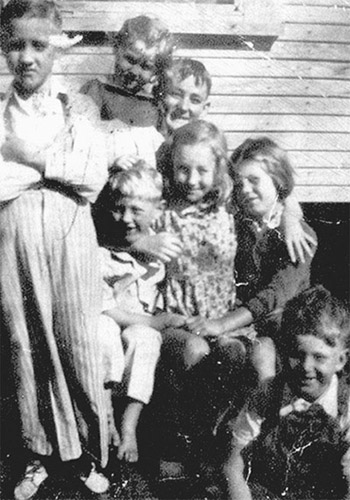
ELVIS ARON PRESLEY IN 1941 OR 42 (DEPENDING ON THE SOURCE) IN HIS HOMETOWN OF TUPELO, MISSISSIPPI.
Next page



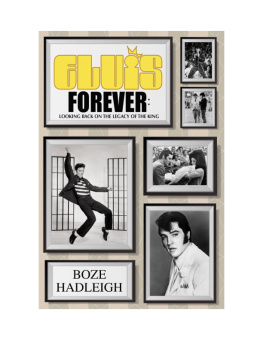
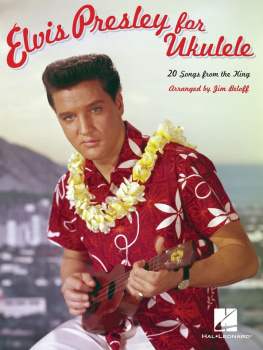
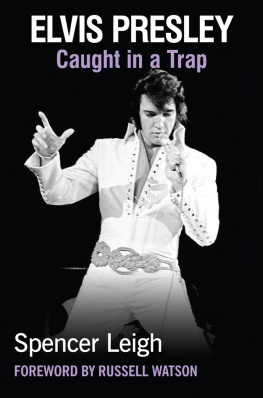
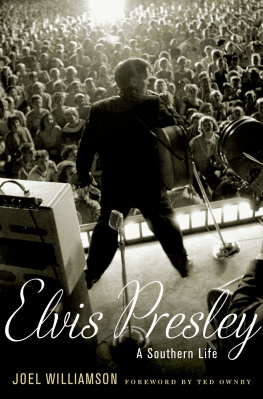

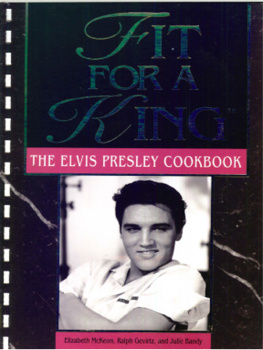
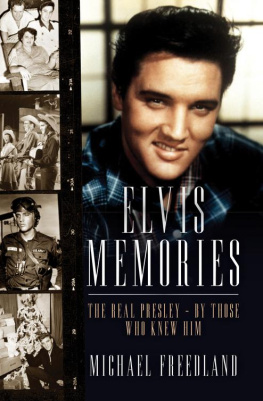


 The paper used in this publication meets the minimum requirements of American National Standard for Information SciencesPermanence of Paper for Printed Library Materials, ANSI/NISO Z39.48-1992.
The paper used in this publication meets the minimum requirements of American National Standard for Information SciencesPermanence of Paper for Printed Library Materials, ANSI/NISO Z39.48-1992.